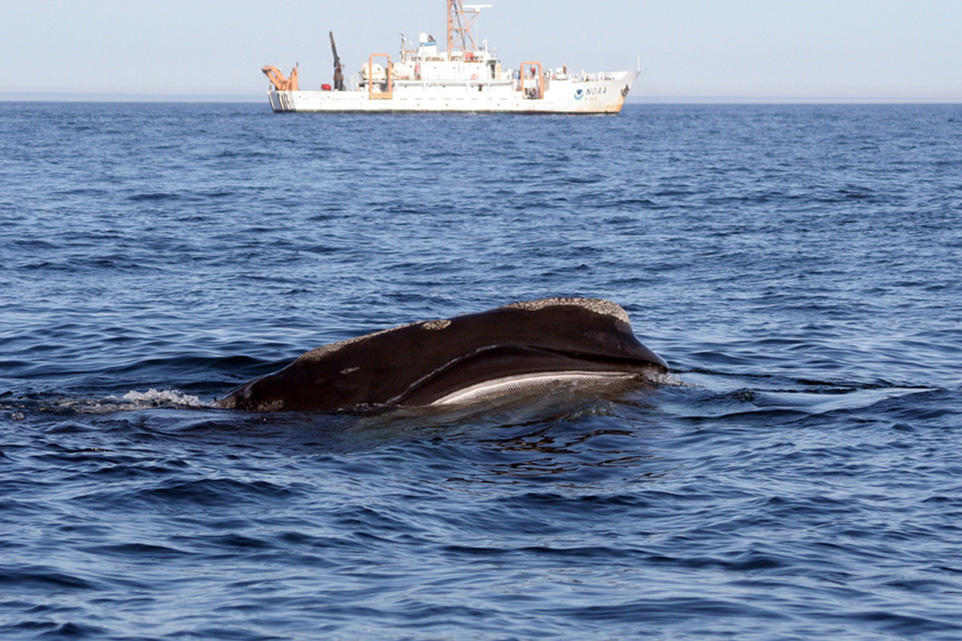
Caption
A North Atlantic right whale swims near a federal research vessel.
Credit: National Oceanic and Atmospheric Administration
LISTEN: A conservation nonprofit says that speeders routinely violate federal “slow zones,” amid lax enforcement. GPB's Benjamin Payne reports.

A North Atlantic right whale swims near a federal research vessel.
Most large ships on the East Coast, including Coastal Georgia, are speeding in violation of federally designated “slow zones” meant to help protect critically endangered North Atlantic right whales, according to a new report by conservation nonprofit Oceana.
84% of vessels exceeded the speed limit of 10 knots — roughly 11.5 miles per hour — when passing through the National Oceanic and Atmospheric Administration's 10 Seasonal Management Areas (SMAs) from Florida to Massachusetts between November 2020 and July 2022.
Applying only to boats 65 feet and longer, SMAs are meant to give North Atlantic right whales more time to avoid fatal collisions with vessels, and to lessen the blow when they do occur.
Only a “handful” of enforcement cases are brought each year by NOAA, according to Oceana fisheries campaign director Gib Brogan.
“It seems to be common knowledge in the maritime community that it's okay to break these rules — that it is highly unlikely that you will be cited, and even less likely that you will receive a fine,” Brogan said. “And if you do receive a fine, it will be a slap on the wrist. The end result is we're not seeing the compliance rates that are necessary to protect North Atlantic right whales.”
The species' population in 2022 stood at roughly 356, according to an estimate released Monday by the North Atlantic Right Whale Consortium, down from 364 in 2021. The group said that the species' yearslong decline may be beginning to level off, but cautioned that North Atlantic right whales still face significant ongoing threats from human activities.
Between 42% and 50% of all speeding vessels in the Oceana study were cargo ships, making them the worst offenders.
“Oceana has reached out to some of the shipping industry corporations, and they've told us that this is a matter that they can plan for — that they prefer to have speed zones that are set ahead of time and they can factor that into their voyage planning,” Brogan said. “It's frustrating to see that this isn't happening. We firmly believe that we can slow boats down and deliver goods into our ports on time and on schedule.”
In addition to increasing enforcement, Oceana wants NOAA to update the location and timing of SMAs, which are currently based on what the group says is outdated data from 2008, when the rule went into effect.
Oceana also wants SMAs to apply to vessels as short as 35 feet, and for NOAA to narrow its list of exemptions, among other measures.
Brogan said that he expects the agency to issue an updated rule by the end of the year.
A bill introduced in June by Rep. Buddy Carter, a Republican representing Coastal Georgia, seeks to delay the issuance of an updated rule.
Carter and Georgia Ports Authority president and CEO Griff Lynch — who supports the bill — have both called it a bipartisan piece of legislation. However, of the bill's 14 cosponsors, only one is a Democrat.
The legislation is held up in the House, as the chamber is currently without a speaker. An accompanying bill in the Democratic-controlled Senate faces tougher odds, as the only Democrat to publicly support it is Sen. Joe Manchin of West Virginia, regarded as one of the most conservative members of his party.